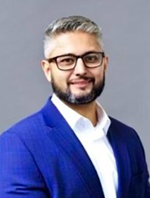Bringing Independent Research to NASA
Aerospace engineer Usman Rafiq (MEM '23) spotted an industry need and turned to students in Northwestern's Master of Engineering Management (MEM) program to help study it.
Usman Rafiq (MEM '23) knows all about the origin of agile project management.
Agile methodology focuses on continuous improvement and collaboration without waiting for the full results of the original plan to be accomplished. This allows for more rapid iteration and development based on feedback as a project is unfolding.
Rafiq, an aerospace engineer at NASA, watched companies like Apple and Tesla leverage agile methodology for their software development, but he had a question: how could agile be applied to hardware creation?
To find an answer, Rafiq turned to a familiar place: Northwestern's Master of Engineering Management (MEM) program.
Rafiq connected with MEM director Mark Werwath, and the two discussed the agile question. They also chatted about digital-twin development, which takes advantage of artificial intelligence (AI) to create a digital replica that can be run through a variety of virtual tests, saving both time and money.
By the end of the conversation, the two had a framework for an independent research project for MEM students.
Rafiq’s project puts a different twist on typical independent research opportunities.
“My course is different from any other independent research because these students will present their outcomes to NASA leadership,” Rafiq said. “The topics we’ll be working on aren’t specific to just NASA but are really specific to how the industry is evolving right now.”
Rafiq, who previously worked at SpaceX and the Marshall Space Flight Center, thought that technical evolution would be of keen interest — and ultimately a key differentiator — for MEM students.
“That way, when they go out there and become program managers or project managers, they know these methodologies and can be successful and climb that ladder in corporate America,” he said.
The independent research project lasts just a quarter, which limits what students might produce. But MEM leadership and Rafiq designed the opportunity so one cohort’s work can be handed to the next for further development.
Every cohort’s students will benefit from the opportunity to practice the soft skills many engineers come into the MEM program needing to hone, Rafiq said.
“We engineers, because of how we’re trained, we tend to get really tied up into the engineering aspects of things and forget who our audience is,” Rafiq said. “I really hope that they can tell a story of their technical finding and create a business plan for NASA leaders to convey that story in a simplified form.”
It’s that combination of engineering acumen and business leadership skills strongly emphasized by the MEM program that led Rafiq to propose the independent research project in the first place.
“The reason I wanted to work with MEM students is because they don't come in with just a business mindset. They understand the technology itself,” Rafiq said. “When you have folks like that who really understand the technology and then find a business plan for that technology, their findings make much more sense.”
The views and opinions expressed in this piece are Usman Rafiq's and do not necessarily reflect the opinions of NASA or any other agency.

